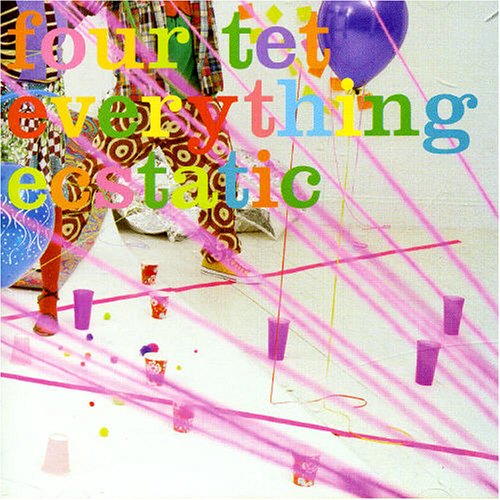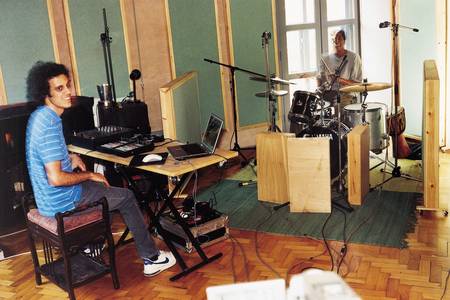Starting here, with my review of the 2005 Four Tet album Everything Ecstatic, I’m now writing for eMusic. I find this, to put it mildly, absolutely thrilling.

One of Kieran Hebden’s more aggressive outings under the Four Tet moniker, Everything Ecstatic veers away from the rustic acoustic guitar loops which, for better or worse, came to represent his earlier work. Here, he replaces those sounds with low-pitched synth rumbles, buried beneath the drum machines like the unrelenting drone of a factory assembly line.
More
As an aspiring music writer, I’m always following bylines and tracking other writers as they hop around between publications, which is why I was able to conclude long ago that eMusic’s editorial division is probably the strongest on the internet. I’m still a little woozy at the thought that I’m now part of it myself. Since I know most people don’t obsess over critics the way I do, a quick run-down of some of the other eMusic contributors whose work I’ve admired elsewhere:
- Amanda Petrusich of Pitchfork and the New York Times
- Michaelangelo Matos, formerly of Idolator and Seattle Weekly
- Will Hermes of the New York Times, who is also quite possibly my absolute favorite Rolling Stone writer
- If it’s not Will Hermes, it’s probably Evan Serpick
- Robert Christgau, the longtime Village Voice writer widely considered the “Dean of American rock critics”
- Chuck Eddy, former Village Voice music editor and Rolling Stone contributor
- Joe Levy, once music editor at the Voice, then the editor of Rolling Stone’s music section, then editor-in-chief at Blender (and now staring at pretty girls all day for Maxim following Blender’s unfortunate demise a few months back)
- Pitchfork managing editor Mark Richardson
- Andy Beta, hyperactive freelancer for Spin, Paste, and the Village Voice
- Andy Battaglia of Pitchfork and The Onion‘s AV Club
- Jess Harvell of Pitchfork and Idolator
- Melissa Maerz, once of New York Magazine and now with Rolling Stone
- Philip Sherburne, electronica guru for Pitchfork (and, notably, a Hot Chip sanctioned composer in his own right)
- Matthew Perpetua, founder of Fluxblog, quite possibly the first-ever MP3 blog
- Chris Weingarten, the go-to guy for Rolling Stone and the Village Voice who started reviewing records on Twitter after deciding that this industry was going to hell in a handbasket
- Thurston Moore, frontman for Sonic Youth
It’s really amazing that they’ve been able to collect all these heavyweights under one masthead. Most dizzying of all, though:

That’s right, I’m now writing alongside Kurt Loder, whose MTV News briefs were a staple of my after-school vegging-out through the 90’s and present every step of the way — prodding me along, actually — as I grew to become an obsessive music fan.
Here’s the thing, though — eMusic isn’t, as you might think, a music magazine.
Rather, it’s an MP3 download store in the vein of iTunes. Its prices are considerably lower, however, and its catalog is heavily skewed toward indie labels. Particularly in the earliest days of the digital music Wild West, it made for a much more customer-friendly download service than Apple’s. For one thing, the audio encoding algorithms were better, a detail about which I care quite a bit, and there wasn’t any Digital Rights Management, a sort of catch-all term for the various forms of nefarious copy protection horseshit that the major labels once demanded the download stores employ before they’d permit inclusion of their tracks. Your previous purchases could even be downloaded repeatedly if need be — say, in the event of a hard drive crash or laptop theft.
Most striking of all, though, was that rather than $1 a-la-carte purchases, a low monthly subscription fee would get you unlimited access to the catalog, meaning that you could explore new music with reckless abandon. A few people used to complain about the selection, which excluded almost all major label content, but I’d just run searches for phrases like “Best Of” and “Greatest Hits,” and the results would overflow with guys like Hank Williams and Nusrat Fateh Ali Khan and Andrew Lloyd Weber — all hugely influential artists that I felt compelled to teach myself about even if they were off the beaten path. With said path being beaten mostly by dolts like My Chemical Romance, it was hard for me to see this as a problem.
eMusic started enforcing monthly limits on customer downloads in 2004 after independent music became hip again and the site’s popularity increased accordingly, which was unfortunate for the customers, but an understandable move overall because the free-for-all obviously wasn’t financially sustainable if proper royalties were to be paid out to the artists. The landscape has changed a lot since then, but even though iTunes has since dumped DRM and doubled its audio encoder bitrates, and even though eMusic has since increased its prices and embraced major label content, I still think they’re doing something remarkable. If you haven’t already, go check out the page on which my review appears and/or one of the artist pages. You will, in a manner of speaking, see the entire internet at a glance.
I spend a lot of time navigating the intersections between art and technology, and can unequivocally say that eMusic’s site is a case study in awesome. They’re able to pull in data from other places — Wikipedia, YouTube, Flickr, the All Music Guide — by sending queries through cross-site connection protocols called APIs. (That’s “application programming interface,” not “Automated Processes, Inc.,” although I can see where the ambiguity comes from.) For example, if they send an artist’s name as specified by the All Music Guide’s API, they might get his bio in return, and then by doing the same per YouTube’s instructions, they can return all his related video embeds.
This is all then rendered as part of the page content, and the effect of so many API’s working successfully and in synchrony is quite breathtaking, producing an evolving aggregate snapshot of the music you’re inquiring about compiled from sources all over the internet. At the risk of sounding like a raving partisan lunatic, especially given my earlier thoughts regarding their other writers, eMusic’s may be the most technically remarkable, staggeringly efficient music discovery platform I’ve encountered. In fact, though I’ve let my payments lapse on a couple occasions — mostly because the music submitted for the coverage I was writing for The Hook had piled up ominously — I’d usually still log in and browse around even though I couldn’t download anything. eMusic might not be able to offer unlimited downloads the way they once did, but the site makes for a very compelling substitute.
As for the ways in which the art — by which I mean both my writing and the songs I write about — collides with the technology, it’s pretty clear to me that eMusic considers their writers an important part of the equation. Just as the writer in me is thrilled about getting filed away alongside Kurt Loder, the geek in me is excited to watch as the writer gets a seat right next to the Wikipedia API. Welcome to the machine, and so forth.




